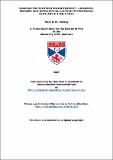Files in this item
Reading the Scottish Enlightenment : libraries, readers and intellectual culture in provincial Scotland c.1750-c.1820
Item metadata
| dc.contributor.advisor | Allan, David | |
| dc.contributor.author | Towsey, Mark R. M. | |
| dc.coverage.spatial | 357 | en |
| dc.date.accessioned | 2008-01-22T16:39:35Z | |
| dc.date.available | 2008-01-22T16:39:35Z | |
| dc.date.issued | 2007 | |
| dc.identifier.uri | https://hdl.handle.net/10023/412 | |
| dc.description.abstract | The thesis explores the reception of the works of the Scottish Enlightenment in provincial Scotland, broadly defined, aiming to gauge their diffusion in the libraries of private book collectors and 'public' book-lending institutions, and to suggest the meanings and uses that contemporary Scottish readers assigned to major texts like Hume's History of England and Smith's Wealth of Nations. I thereby acknowledge the relevance of more traditional quantitative approaches to the history of reading (including statistical analysis of the holdings of contemporary book collections), but prioritise the study of sources that also allow us to access the 'hows' and 'whys' of individual reading practices and experiences. Indeed, the central thrust of my work has been the discovery and interrogation of large numbers of commonplace books, marginalia, diaries, correspondence and other documentary records which can be used to illuminate the reading experience itself in an explicit attempt to develop an approach to Scottish reading practices that can contribute in comparative terms to the burgeoning field of the history of reading. More particularly, such sources allow me to assess the impact that specific texts had on the lives, thought-processes and values of a wide range of contemporary readers, and to conclude that by reading these texts in their own endlessly idiosyncratic ways, consumers of literature in Scotland assimilated many of the prevalent attitudes and priorities of the literati in the major cities. Since many of the most important and pervasive manifestations of Enlightenment in Scotland were not particularly Scottish, however, I also cast doubt on the distinctive Scottishness of the prevailing 'cultural' definition of the Scottish Enlightenment, arguing that such behaviour might more appropriately be considered alongside cultural developments in Georgian England. | en |
| dc.format.extent | 1676375 bytes | |
| dc.format.mimetype | application/pdf | |
| dc.language.iso | en | en |
| dc.publisher | University of St Andrews | |
| dc.subject | Scottish Enlightenment | en |
| dc.subject | History of reading | en |
| dc.subject.lcc | Z1003.5G7T7 | |
| dc.subject.lcsh | Books and reading--Scotland--History--18th century | en |
| dc.subject.lcsh | Books and reading--Scotland--History--19th century | en |
| dc.subject.lcsh | Scotland--Intellectual life--18th century | en |
| dc.subject.lcsh | Scotland--Intellectual life--19th century | en |
| dc.title | Reading the Scottish Enlightenment : libraries, readers and intellectual culture in provincial Scotland c.1750-c.1820 | en |
| dc.type | Thesis | en |
| dc.contributor.sponsor | Arts and Humanities Research Council (AHRC) | en |
| dc.type.qualificationlevel | Doctoral | en |
| dc.type.qualificationname | PhD Doctor of Philosophy | en |
| dc.publisher.institution | The University of St Andrews | en |
This item appears in the following Collection(s)
Items in the St Andrews Research Repository are protected by copyright, with all rights reserved, unless otherwise indicated.

